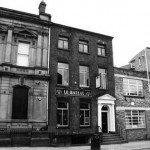So, farewell then, The Post
There was a window, a chance to save the Post, but it closed a few years ago. After the digital ship sailed, and post hemorrhaging some of the best writers. But, as ever, it’s all about timing, and for the Post - its days were numbered.
A weekly newspaper in a frenetic world? It was never going to happen. Sundays thrive because of their supplements, their tittle tattle and their long-form investigations. Local weeklies? They’re for car boot announcements and bob-a-job weeks.
To counter the breathless scaremongering and gangland fetishism of the Echo, Liverpool needed slow news. It needed context. It needed reflection. The smarter move would have been to take the Post into a perfect bound monthly edition, similar to New York magazine, or any of the successful US city titles that offer the right degree of differentiation from the daily press. Big, meaty features deserving of a city with newly formed muscle. Photo spreads, comment and analysis.
In its weekly iteration, The Post tried valiantly to ape the newspaper-as-magazine format (as the Independent has, convincingly, carried out, and, in the local press, the Bristol Post), and it scored many palpable hits.
But a weekly? On an indeterminate weekday? It was never going to work. We’re a small city. The paper was too slow for news, and too fast for long-form investigation and considered exploration. But, like Trinity itself, it was stuck, awkwardly, between the past and the future.
The city will lose decent arts coverage (one hopes Laura Davis will be allowed to shake up the Echo’s curation of the city’s culture) and it remains to be seen how the Post’s business coverage will colour the Echo’s city pages. What’s encouraging is the news that no journalists will lose their jobs.
But the paper, despite its heritage, was still confused and unsure of its place in the new world - finding space for Carolyn Hughes’ godawful PR puff pages showed that Mark Thomas never really understood how to grab the demographic so cruelly short-changed by the Echo, and was sucked, moth to the flame, into the city’s seamy underbelly of charity galas and awards. The success of publications like our own, Bido, Liverpool Confidential etc, showed that the middle ground was his to lose, and that there was a growing space, in Liverpool, for the tribe that didn’t sexy network.
We wrote to Thomas, suggesting a different way to engage with those in the city disenfranchised with The Echo. His reply was aloof and dismissive: “As a newspaper that has been publishing in Liverpool for 156 years… (we know what we’re doing)…”
We can all get misty eyed about its demise, and a city with only The Echo in its corner is a sorrier place indeed. But we don’t believe the official line that the Liverpool City Region is too small to support a title like The Post. That, again, is cynical and short sighted. Liverpool could, and should, have an intelligent, curious and relevant publication fighting its corner. Now, more than ever before, we have the stories, and we have the audience.
That it doesn’t says more about the cynical manoeuvres of Canary Wharf: when the chips (or should that be Burger and Ships) are down, it’s all hands on the mothership. This is a move that’s every bit about saving the ad revenue of ambulance chasing solicitors and tanning salons, and not about playing the long game, and forging out a new way for the city to engage with itself. To fight for the higher ground. Because that’s where we belong. If SevenStreets can carve out a 50,000 strong audience, surely the combined might of Trinity could do the same. But the appetite, and investment, was never there.
In announcing the closure, Trinity Mirror North West Managing Director, Steve Anderson Dixon said: “The Post is a wonderful and much-loved old lady who has simply come to the end of her natural life.”
That, to us, just about sums up how wrong-footed, patronising and lacklustre Trinity’s stewardship of the paper has been. The Post, when it was fired-up, was as vital, thrilling and surprising as any of the young pretenders to its throne. It is the tenure of those in charge, not the writers at The Post, that - surely - has come to the end of its useful life.
To those who visit our city, post Post, we feel duty bound to explain to you: We are not The Echo.
To the staff of the Post, we wish you well, and thank you for your great work.



